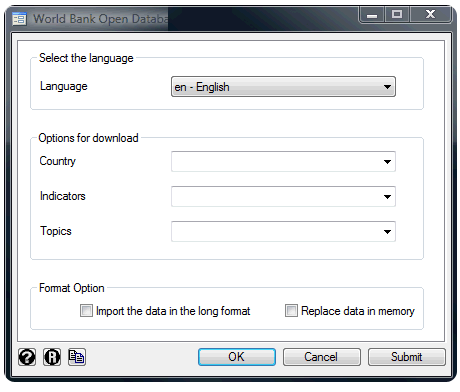wbopendata: Stata module to access World Bank databases
Note: The latest version of the wbopendata module is 16.3. This version is required to work with the latest updates to the API as of July 8, 2020. It is available for download from SSC.
wbopendata allows Stata users to download over 3,000 series of indicators from the World Bank databases, including: Development Africa Development Indicators; Doing Business; Education Statistics; Enterprise Surveys; Global Development Finance; Gender Statistics; Health Nutrition and Population Statistics; International Development Association - Results Measurement System; Millennium Development Goals; World Development Indicators; Worldwide Governance Indicators. These indicators include information from over 256 countries and regions, since 1960.
It can be easily installed from
the Statistical
Software Components repository, by simply typing, from within the Stata
command line interface:
ssc install wbopendata
After this process wbopendata works just like any other Stata command,
users can type either
help wbopendata
or
db wbopendata (to activate the visual interface)

Users can chose from one of three of the languages supported by the database (and Stata), namely, English, Spanish, or French.
Three possible downloads options are currently supported:
- country - all indicators for all years for a single country.
- topic - all indicators within a specific topic, for all years and all countries.
- indicator - all years for all countries for a single indicator.
Users can also choose to have the data displayed in either the wide or long format (wide is the default option). Note that the reshape is done locally, so it will require the appropriate amount of RAM to work properly.
Here is a list of examples to get you started.
wbopendata draws from the main World Bank collections of development indicators, compiled from officially-recognized international sources. It presents the most current and accurate global development data available, and includes national, regional and global estimates. The access to these databases is made possible by the World Bank's Open Data Initiative which provides open full access to World Bank databases.
Acknowledgements:
This program was developed by Joao Pedro Azevedo.A special thanks to the World Bank Data Group team, in particular, Malarvizhi Veerappan, Lakshmikanthan Subramanian, Shanmugam Natarajan, Ugendran Machakkalai, Rochelle Glenene O'Hagan, Timothy Grant Herzog, and Ana Florina Pirlea.
The author would like to thanks comments received from Minh Cong Nguyen, John Luke Gallup, Aart C. Kraay, Amer Hasan, Johan Mistiaen, Roy Shuji Katayama, Dean Mitchell Jolliffe, Nobuo Yoshida, Manohar Sharma, Gabriel Demombynes, Paolo Verme, Elizaveta Perova, Kit Baum, Kerry Kammire, Derek Wagner, Neil Fantom and Loiuse J. Cord.
Reference:
For more updated information and beta releases of WBOPENDATA, follow the GitHub repository.
In the case of comments and/or suggestions regarding this application please contact data@worldbank.org

